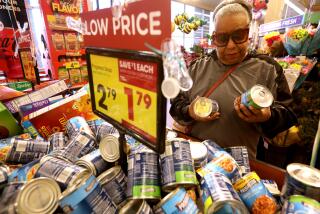Muscovites Find They Have to Compare Prices : Shopping: Under Communist rule, because of shortages, they would buy anything available. Soaring costs have forced them to be more prudent.
MOSCOW — With the price of butter and other basic food items fluctuating wildly from store to store, Muscovites accustomed to government-regulated prices are being forced to learn the art of comparison shopping.
Before Russian President Boris Yeltsin lifted controls on Jan. 2, most prices in state-run stores were so low they didn’t even cover production costs. That didn’t provide state-owned companies with incentive to turn out goods, resulting in decades of shortages and poor quality.
Most Muscovites were happy to purchase almost anything edible they could find in stock at government stores without even checking the price.
The rule was: If you see a line for food, get in it. Only after you had secured a place did you need to check what was on sale. And even if you didn’t want it, you’d buy it because your neighbor, your sister or your father most likely would need it.
Now shoppers are confronted with widely varying prices for the same item.
“I’ve personally seen the prices, my family has seen the prices, my friends have seen them. This is a better deal,” said Moscow resident Yuri Kisilov on Monday, nearly two weeks after prices were freed.
Kisilov, a local hockey coach, was nearing the end of an hour wait to buy nearly 2 kilograms (4.4 pounds) of imported Australian butter for 51 rubles per kilogram at a downtown government-run store.
“In other stores butter is more expensive--up to 120 rubles per kilo. This store is in the center (of town), and so it’s better-stocked and cheaper than in the suburbs,” he said.
At a nearby fish store called Gifts of the Sea, Yelena Zhukovskaya, 84, decided to spend some of her pension on a frozen, purplish block of squid.
“The only thing I know is that 13 rubles for squid is reasonable,” she said.
The Russian Labor Ministry estimates the average monthly salary is about 960 rubles. One ruble is worth about one U.S. cent at the official tourist rate.
Kisilov, the hockey coach, was shopping in a crowded, muddy shop named Milk on Tverskaya Street. Its dingy shelves offered butter, eggs, chocolate-flavored cream cheese and fewer than 10 bottles of milk.
The milk was priced at 11 rubles for a half-liter bottle (about half a quart), more than 10 times the previous regulated price. Nobody was buying, even though milk has become so scarce that irate Moscow residents blocked a downtown bridge Sunday in protest.
On Monday, Russia’s parliament leader, Ruslan Khasbulatov, sharply criticized the government price increases as “utterly senseless, divorced from the realities of economic life.”
Just back from a trip to the Russian city of Ryazan, Khasbulatov told the Russian legislative leadership that he saw milk there priced for 17 rubles a liter and cited this as an example of what he termed “uncontrolled, anarchic and runaway price increases.”
Across the street from Moscow’s Milk shop, the ornate Yeliseyevsky Gastronom was crowded with long lines of testy shoppers.
The store’s meat section was nearly deserted, however. Only a few people stood at the main meat counter, staring incredulously at meaty sausage priced at 500 rubles per kilo (227 rubles per pound) and packages of vacuum-packed pressed ham for 331 rubles per kilo (150 rubles a pound).
Some shoppers said they were learning to be choosy.
Sergei Solovyov, a musician, said he wouldn’t be able to buy the meat every week although he was looking forward to purchasing it for a special occasion. “The price is expensive, but the product is quality,” he said. “You won’t be able to find ham like this in another store.”
More to Read
Sign up for Essential California
The most important California stories and recommendations in your inbox every morning.
You may occasionally receive promotional content from the Los Angeles Times.










